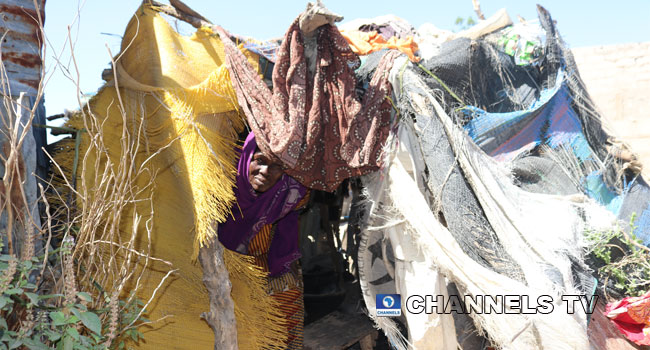
By Blessing Tunoh
Biski is a Kanuri food made from crushed maize grains often served with local soups. Suitable and proudly served in different variances on all occasions.
This is the most important assistance that Ya’Kolo Umar, a seventy-year-old Kanuri woman from Damboa local government of Borno State yearns for to make her happy for the rest of her life. At her age, Ya’Kolo once a wealthy farmer has seen it all and very few things thrill her these days.
The harmattan season is setting in and though the sun is shining brightly, the cold breeze is nonetheless fierce as it blows the fine Sahara sand around. You are sure to get a generous deposit in your eyes if you don’t squint or wear a covering as you move around. Ya’Kolo sits on her bed in her little room this Friday morning, thankful for the shelter over her head and the blessing of food to eat. Breakfast is boiled rice garnished with local peppery spices (yaji), part of the proceeds of alms given to her by well-meaning people. She has been living on alms for the past four years depending on neighbours for her daily subsistence.
Fridays are her work-free days and she adorns clean clothes also given to her by charitable people. She proudly flaunts her shiny grey hair popping out of her purple veil, with the weaving lines of her kla yasku hairstyle covered by hair. But Ya’Kolo has not always been a beggar.

“Ushe-Ushe” she calls out a welcome greeting in Kanuri language when this journalist visited her home in Jiddari Polo, a densely populated residential area in Maiduguri. Home is a low roofed shanty-styled shelter constructed with corrugated zinc sheets on a 25 by 50 plot of land flanked by brick fenced buildings on both sides, providing a covering for the septuagenarian.
The neighboring plots once belonged to Ya’Kolo originally 100 by 50 square in all, acquired in her heydays as a vibrant farmer in a small village in Damboa local government.
A journalist and Borno NUJ chairman Bulama Talba had posted pictures of the shanty on his Facebook page making public the living condition of the elderly woman.

“I live just a few kilometers away from here and this is my normal route to work. When I first saw her I thought her living condition was pathetic and after I asked her a few questions she said her only problem was that her pit toilet had collapsed so I had it fixed and put a slab on it. Then I took pictures of her house and posted it on my wall encouraging people to support her.” Talba stated.
“This is my house, and this is my plot of land. I bought it a long time ago. I can’t remember how much I bought it, I think it was N10,000. It was through my brother that I bought it. That time the whole of this place was a bush, there wasn’t a single house here. We bought it from the Bulama. My brother sold part of the land and left this small portion for me. He spent the proceeds alone and didn’t give me part of it. He is now dead. I have lived here for four years.” Ya’Kolo recounts.
“Bulama Ba’Lai Abuye was the one that sold this place to me. That year I farmed Bambara and groundnuts then I transported it to Maiduguri and sold it, that’s where I got the money and gave it to my late elder brother to buy this plot of land for me. My farm was in a village called Ngazaman near Damboa.” She explains.
People in the community confirm and clarify that the Ba’Lai Abuye whom she makes reference to was the Bulama of Jiddari Polo when she bought the property. Bulama is the Kanuri parlance for village head and Ba’Lai Abuye’s reign was until 1991 when he passed on, placing the date of her purchase of the property at the late eighties. When she made that investment, little did she know that it will become her lifeline decades later.
After several failed marriages her rationale at that time was to live close to her only surviving brother who also lived there and took her in to live with his family. But upon his passing according to her, his children gave her a quit notice.
“They said since I have my plot I should go and stay in it so I came and started staying here. So the Ba Bulama gave me ten zinc sheets with which I constructed this structure. And I went around begging people who donated zincs to me with which this structure was put together.”
Over the years, Jiddari Polo has been a convenient entry point for insurgents through the southern wing of Maiduguri and it has had its fair share of attacks, the last occurring in May this year. Ya’Kolo is lucky to survive all and her strategy is simple. “When they come we run away from home, and when the situation subsides we come back.” She says with a proud smile. The insecurity has cut her off from her two biological children who live in Damboa, some 88 kilometers away.
“They are in Damboa, the female is married and lives with her husband, the male is a farmer. When Boko Haram chase them from the farm they run away, when they are done with their operation and retreat, they return to the farm. So I have more peace of mind living here even though there’s no one to help me here.” She says.
Ya’Kolo has no idea how old she is, but recalls that she had just had her first baby “when Igbos started fighting and the baby’s naming ceremony which usually happens on the seventh day was yet to be conducted.” She is probably referring to the civil war which broke out in July 1967. Traditionally at that time girls are married off between the age of 14-15 and if Ya’Kolo was 15 in 1967, she is estimated to be about 70 this year.

She was an accomplished farmer but she never got as lucky with her marriage which informed her decision to live with her late brother.
“I have married up to ten men in all, but they all sent me away. I used to be troubled by evil spirits and so I will always pass out when it starts and it scares them so they divorce me. I get married, they divorce. I get married, they divorce me. It continued like that until I married ten times and then I decided I was done. Even when I go to the market I don’t see anything I only see a red piece of cloth and things like that. But the chief imam of Maiduguri at that time helped me and gave me some remedies and now I am fine I no longer have that problem again Alhamdulillahi,” she says.

These days Ya’Kolo is no longer strong enough and does not have access to farmlands like she did in her younger days. Her fortune has nosedived from buying a property from the proceeds of her farm to harvesting only three bowls of beans in this year’s farming season for which she says she is still grateful to God.
“I cook my food by myself. I go out to beg for alms. Yesterday I went out and I got biski and rice which I cooked. I didn’t go out today because it’s a Friday that’s why I took my bath and wore these nice clothes, that was given to me as sadaka.”
Rain and Spring
“I suffer a lot during rainy season. Twice the rain had blown off this house before it was fixed back and the rain enters my house. For the cold season, they also gave me a blanket as sadaka one of the days when I went out to beg; so I cover my body properly with it and I don’t feel the cold that much.” She says.
These days she is not able to walk long distances because her knees are beginning to hurt. She also says it’s always very hard to fetch water from the nearby community borehole and bring it home for her use. These, are the only problems she is aware of.
When asked if she would love to live in a brick house she says “I would love it, it will be nice.” Ya’Kolo is comfortable in her skin and her little world that consists of her shanty, two children, and two grandkids whom she speaks with every other day on her mobile phone. She cannot be bothered by the hustle and bustle of the larger world.

When asked if she knows who Governor Zulum is and what message she has for him, her response is noble: “I hear stories about him, they say he is the governor but I’ve never met him. I hear that he shares money but it has never reached my hand. My message to him is he should send me some money to buy biski!”
Contentment is probably the reason that Ya’Kolo has thrived this long in good health in the midst of all the challenges life has thrown at her. She enjoys the charity of neighbours and strangers and left to her all she needs right now is food, and it has to be biski, specifically.


